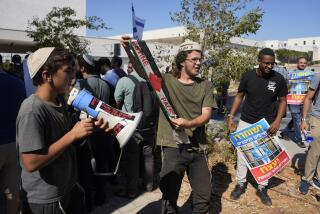Undercover Israelis Stir Rights Concern : Occupied areas: Some fear that military censorship may hide abuses against Arabs.
- Share via
JERUSALEM — The official disclosure that armed squads of undercover soldiers operate in the West Bank and Gaza Strip has kindled concern that the army units might have been responsible for human rights abuses that, because of military censorship, have not been publicized in Israel.
The army, at the order of its new chief of staff, Lt. Gen. Ehud Barak, disclosed the existence of the squads in a television report last week that showed soldiers who disguised themselves as Arab men and women and then were seen arresting wanted activists of the Palestinian uprising.
A public debate quickly broke out over whether it was wise to give details of the secret units and thus tip off the Arabs. Liberal politicians hailed the report as satisfying the public’s right to know about activities carried out in its name.
By Tuesday, attention began to turn toward exactly what the units are doing. The Assn. of Civil Rights in Israel, an independent watchdog organization, announced that the army had opened an investigation into one undercover unit that was involved in the beating of Arab detainees three years ago.
Over the past three years, foreign newspapers have reported instances of the questionable practices of plainclothes police and soldiers that reportedly resulted in shooting deaths of Palestinians in the occupied West Bank.
Last year, a soldier dressed as a tourist in Bethlehem shot and killed a young stone-thrower. In Hebron, a plainclothes officer killed a masked Palestinian who was spray-painting graffiti on a wall. In Ramallah, an undercover soldier shot a fleeing street leader of the Arab uprising as he fled down a busy street at midday.
It was not until Tuesday that Israeli newspapers began preparing to publish accounts of such incidents.
Undercover police and soldiers have also disguised themselves as reporters in order to capture rebel suspects, a practice that was dropped after complaints from journalists.
Foreign correspondents who reported such incidents were subject to reprimand from the military censor and, on occasion, loss of their government-issued credentials. Joshua Schoffman, a lawyer for the Assn. of Civil Rights, called the practice “an improper use of censorship power.”
“The Israeli public has a problem in finding out what is going on,” he said.
Over the course of the Arab uprising, the use of firearms against fugitives has marked an easing of rules governing the army’s response to the unrest. When the revolt began 43 months ago, soldiers were ordered to shoot only when their lives were thought to be in danger. Later, soldiers as well as undercover agents were given leeway to shoot at masked participants in street unrest and at fleeing suspects.
Last week’s television report depicted soldiers donning false mustaches and mascara as they prepared to infiltrate Palestinian groups. In one instance, an Israeli dressed in a woman’s veil tackled a Palestinian while “her” partner, who wore a male Arab headdress, pulled out a pistol and shouted at the captive in Hebrew.
In a Tuesday appearance before a parliamentary panel, Gen. Barak justified the publicity for its supposed deterrent value. It also was meant to show Palestinians that the army is mainly after hard-core activists, he said. Israeli military overseers in the West Bank and Gaza have long been campaigning to alienate the mass of Palestinians from small, increasingly beleaguered and violent youth groups.
According to state-run Israel Radio, Barak said that the units are designed to sow confusion among Palestinians. Earlier, an army spokesman had declared: “This was a good and important message to the Arab population in the territories. No one who they see around can be immediately identified as friend or foe.”
Finally, the exposure was meant to boost Israeli civilian and military morale by showing troops doing something daring to break the uprising, known as the intifada. Many Israelis despise duty in the West Bank and Gaza because it often involves shooting into crowds, giving chase to women and children and demolishing houses.
“About what should we be ashamed?” asked columnist Yoel Marcus in the Yediot Aharonot newspaper. “It is preferable to see the (army) fighting against pinpointed targets than using clubs and shooting rubber bullets at women and children.”
But a commentator in the daily paper Haaretz noted that historically such undercover groups run the risk of getting out of control. The writer, Zeev Tzacher, expressed hope that publicizing the units will be a means of keeping a rein on them.
It is far from clear that the operations of the undercover units will undergo full scrutiny in the government. At the end of Chief of Staff Barak’s testimony to Parliament, the head of the committee in charge said that as far as he is concerned, the case is closed.
More to Read
Sign up for Essential California
The most important California stories and recommendations in your inbox every morning.
You may occasionally receive promotional content from the Los Angeles Times.













